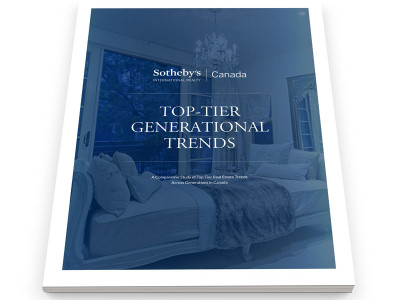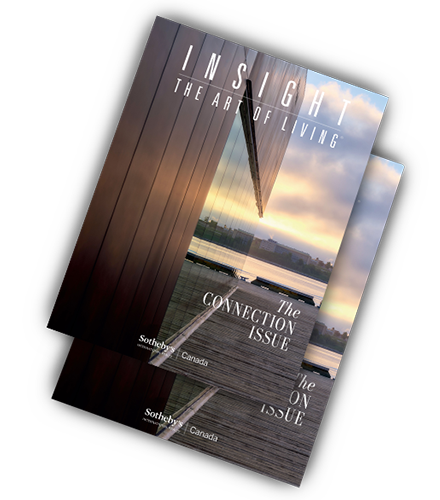
Sotheby’s International Realty Canada’s recently released 2015 Top-Tier Generational Trends Report: A Comparative Study of Top-Tier Real Estate Trends Across Generations in Canada is the first Canadian survey to reveal emerging trends in top-tier real estate preferences and consumer behaviour across three pivotal generations: baby boomers, generation X and generation Y.
Based on in-depth interviews with the leading 10% of agents within four key markets in the Sotheby’s International Realty Canada network, the report includes information on generational preferences, buyer profiles, property characteristics, neighbourhood preferences and other critical homebuying trends. It also highlights regional generational insights for Vancouver, Calgary, Toronto and Montreal, and introduces first-of-its kind intelligence to answer the question: what defines a top-tier home and neighbourhood from generation to generation in Canada’s largest metropolitan centres?
Download the 2015 Top-Tier Generational Trends Report
National Generational Highlights:
Baby Boomers (1946-1965)- Luxury Real Estate Traditionalists
According to the most recent Canadian census, 9.6 million people, or close to 30% of Canadians are baby boomers. Key luxury real estate trends for this generation include:
- Luxury real estate traditionalism. According to survey insights, the baby boomer cohort has the most traditional standards for luxury properties and neighbourhoods. They are most likely to purchase homes in longstanding prestigious communities and to seek out neighbours of similar socio-demographic backgrounds. This cohort is also more likely to favour condominium residences affiliated with international luxury brands.
- Upsizing and « rightsizing » Across all four major markets, affluent baby boomers with children and/or elderly parents living at home are likely to upsize by purchasing a luxury detached single family home at a minimum size of 3,000 square feet (above grade). At a stage at which lifestyle simplification becomes a priority, the trend is for this cohort to « rightsize » into large living spaces on fewer levels, rather than to downsize into significantly smaller properties. Luxury condominiums are the favoured property type for this segment in most major cities, with minimum square footages starting from 1,700 square feet in Vancouver, 2,200 square feet in Toronto and 2,500 square feet in Montreal. Calgary rightsizers are more likely to opt for luxury townhomes, bungalows or infills with a minimum 2,500 square feet.
- Urbanism. The percentage of luxury homebuyers of the baby boom generation purchasing within 5 km of the downtown core is over 85% in Vancouver and 80% in Montreal, according to survey insights. Over 90% purchase within 10 km of Toronto’s downtown core. This trend is less prominent in Calgary due to the location of many of the city’s most prestigious neighbourhoods in suburban areas.
- Community driven. Although a neighbourhood’s prestige and exclusivity are the key attributes defining a top-tier neighbourhood for this generation, walkability and community/social connection are also ranked as high priorities.
- Influence. As the most asset-rich of the generations surveyed, baby boomers have the most influence on Canada’s luxury housing market. The typical price range of luxury property purchased is $2-5 million in Vancouver, $1-4 million in Calgary, $2-4 million in Toronto and $1.5-2 million in Montreal, the highest ranges of the generations examined. Furthermore, this cohort is highly likely to own multiple real estate assets and to be the source of financial support for generation Y homebuyers. With the majority of this cohort earning a combined household income of $300,000- $500,000 and often above, those who carry mortgages do so as a deliberate investment strategy rather than out of necessity.
Generation X (1965-1979) – Family-Driven Aspirational Buyers
Currently at ages 36 to 50, generation X is at the prime life stage for marriage, family and home ownership. Key trends in luxury home buying for this cohort include:
- Family-driven priorities. The proximity to a desirable school is the most important home attribute for generation X, followed by space for growing families. As a result, detached single family homes at a minimum of 2,500 square feet above grade in Vancouver and Calgary, 2,000-3,000 square feet in Toronto, and 3,500-4,500 square feet in Montreal are the most common property types purchased by this cohort.
- Aspirational purchasing. For this group, luxury property purchases are often reflective of newly achieved levels of professional success and financial standing. The typical price of a luxury home purchased ranges from $2-4 million in Vancouver, $1-2 million in Calgary, $1.5-2.5 million in Toronto, and $1-1.5 million in Montreal, according to survey insights.
- Engaged and accessible communities. In contrast to baby boomers, this generation is redefining the boundaries of luxury neighbourhoods by purchasing luxury properties in socio-economically heterogeneous areas that offer diversity and community engagement. While escalating housing costs are one contributing factor to the emergence of new top-tier neighbourhoods, survey insights reveal that changing generational values are another key driver.
- Financial self-sufficiency. Survey insights indicate that unlike generation Y, only a small minority of generation X receives family gifts or assistance on their initial downpayment, relying on mortgages and above-average dual incomes commonly ranging from $250,000 – $500,000 in both Vancouver and Toronto, $100,000 – $500,000 in Calgary, and $100,000 – $300,000 in Montreal to achieve a desirable home.
Generations Y (1980-2000) – Luxury Real Estate Trailblazers
Generation Y has only recently emerged as a Canadian home buying segment but is already actively redefining the luxury real estate market. Key trends include the emergence of:
- First-time luxury condo buyers. The predominant preference among this segment of first-time luxury homebuyers is for presale or new condominiums with a minimum 800 square feet in Vancouver, 900 square feet in Toronto, and 850 square feet in Montreal. In Calgary, this generation has a unique preference for townhomes and infills of a minimum 2,000 square feet.
- Influential spenders. The entry price points of generation Y luxury homebuyers typically range from $800,000- $1 million in Vancouver, $800,000- $1.5 million in Calgary, $800,000- $2 million in Toronto, and $400,000 – $1.5 million in Montreal. These entry prices are nearly double that of average Canadian first-time homebuyers.
- Neighbourhoods as living rooms. Generation Y is willing to sacrifice space in favour of a trendy and urban location, treating neighbourhoods, as a direct extension of their personal living space.
- Urban, diverse and eclectic top-tier neighbourhoods. Changing generational values are redefining top-tier neighbourhoods as urban, eclectic, emerging areas with socio-economic, ethnic and linguistic diversity. The percentage of generation Y luxury homebuyers purchasing within 5 km of the downtown core is over 90% in Vancouver, 70% in Calgary and 95% in Montreal, according to survey insights. Over 85% purchase within 10 km of Toronto’s downtown core.
- Eco-consciousness. Particularly in Vancouver and Toronto, generation Y prefers homes and neighbourhoods with bike paths, pedestrian walkways and easy access to public transit.
- Instant luxury. As highly informed and sophisticated real estate consumers, generation Y requires new, quality homes with luxury features built in.
- Financially assisted. Despite above average incomes most often ranging from $100,000 – $200,000 in Vancouver, $50,000 – $100,000 in Calgary, $80,000 – $250,000 in Toronto, and $100,000 – $200,000 in Montreal, over 85-95% of luxury buyers are reliant on mortgages. The vast majority also receive outside financial assistance towards down payments, primarily from baby boomer parents.
Download the 2015 Top-Tier Generational Trends Report
Disclaimer
The information contained in this report references insights gained from in-depth, qualitative research conducted within the Sotheby’s International Realty Canada network in Vancouver, Calgary, Toronto and Montreal. Sotheby’s International Realty Canada cautions that while qualitative survey feedback can be useful in establishing trends, it is not intended to represent as or replace quantitative data and statistics from official statistical sources. Although high standards have been used in the preparation of the information and analysis presented in this report, the accuracy and completeness of the information is not guaranteed. No responsibility or liability whatsoever can be accepted by Sotheby’s International Realty Canada, Sotheby’s International Realty Affiliates or research contributors for any loss or damage resultant from any use of, reliance on or reference to the contents of this document. This report is published for general information only and not to be relied upon in any way.



